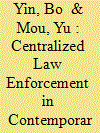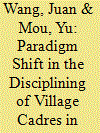| Srl | Item |
| 1 |
ID:
192181


|
|
|
|
|
| Summary/Abstract |
In 2018, China's general secretary, Xi Jinping, announced a three-year war on “black societies and evil forces” and promised to take down various forms of organized crime and evil forces within society. This article examines the operational features of this particular crackdown and how they diverged from previous “strike hard” campaigns. This campaign adopted novel strategies including embedding instructions on law enforcement within criminal justice institutions, promulgating special rules on the crimes of evil forces in order to “strike” campaign targets early, and deploying intrusive investigation tactics that focused on the person and not the crime. Using democratic centralism as a liberal lens, this campaign showcases the struggle between the imperative of legality and the politics of a major campaign in China.
|
|
|
|
|
|
|
|
|
|
|
|
|
|
|
|
| 2 |
ID:
181931


|
|
|
|
|
| Summary/Abstract |
Village cadres are important agents for the state yet disciplining them has been difficult. There are few disciplinary tools that can easily hold them to account. Prior to 2018, Party discipline did not apply to non-Party cadres. Legislation was ambiguous in relation to these grassroots agents and had to rely heavily on legal interpretation. The impact of the cadre evaluation system on village cadres, who are not considered to be public servants on the state payroll, was limited. This situation has changed since 2018. The party-state has consolidated and institutionalized ways in which grassroots cadres are checked and disciplined. Instead of relying on policy regulation, which had been the dominant disciplinary method since 1949, village cadres are now fully subject to Party rules and state laws. These changes have been accomplished through the application of three measures. First, village Party secretaries are to serve concurrently as village heads, and members of village and Party committees are to overlap, thereby making them subject to Party discipline. Second, village cadres are now considered to be “public agents” and are on an equal legal footing with other state agents. Finally, a campaign waged by the criminal justice apparatus cleaned up village administration and prepared it for upcoming village elections in a new era.
|
|
|
|
|
|
|
|
|
|
|
|
|
|
|
|